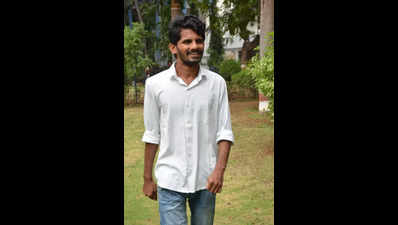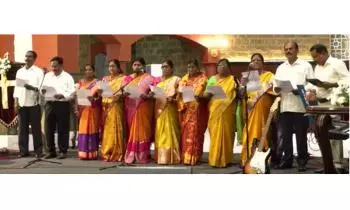
Hyderabad: From a nondescript tribal hamlet to leading student politics in one of South Asia’s premier language universities – Vikas Porika has charted a path for himself that even he never imagined he could.
Today, standing at the helm of the student’s union at Hyderabad’s English and Foreign Languages University (EFLU), the first-generation learner from Subbakapally thanda in Telangana’s Jayashankar Bhupalpally district, has only one vision: To see more youth like him get an education.
“Education shouldn’t be a privilege…it should be a fundamental right that reaches every thanda and every basti,” said the student of MA Spanish when TOI recently caught up with him on campus. He spoke about his plans to help more aspirants crack the entrance to the university and said, “Every first time learner should ensure that another follows them. One helping hand at a time can make all the difference.”
A member of the Telugu Students Forum, Vikas won the president’s seat in the elections held in Nov to become the first tribal student to ever hold that post.
Going forward, he wants to see this turn into a norm.
Making Education Inclusive
But the 23-year-old student’s current focus is on making institutions like EFLU more inclusive. “It’s ironic that this premier institution has just two students from the surrounding residential areas and bastis,” Vikas said, adding, “The very communities living in the shadow of our campus cannot access its education.”
Quoting Telangana poet Gaddar’s famous lines about the state of education: “If there is a teacher in class, there is no chalk piece; if there is chalk, there is no teacher; and if there are both, then the blackboard is wet or broken…”, he said how the solution lies in grassroots transformation.
“We need to fix education at its foundation,” Vikas said, emphasising how it is not just about getting students into universities but “also about preparing them from primary school onwards.”
Rural-Urban Leap
Especially since this is something Vikas didn’t get. In fact, his first encounter with urban life came only in 2019 when he joined EFLU. “I saw a new world in Hyderabad,” he recalled. The cultural and linguistic shock was overwhelming for someone who spoke Lambada at home and had limited exposure to English and Hindi.
“I felt I was falling behind due to English. People would give self-introductions for six minutes so fast, and I only knew two sentences,” he shared, describing his initial struggles. His determination led him to find innovative ways to learn the language, including using popular music. “Alan Walker’s ‘Where Are You Now’ was my first English song – it had easy lyrics to learn from.”
The financial constraints were equally challenging. ‘I remember paying my fees with 140 Rs 10 notes totalling Rs 1,400,” he said, highlighting the economic hurdles faced by students from rural backgrounds. It wasn’t until his first semester that he could afford his first mobile phone.
Urban Survival and Barriers
The transition to urban education brought its own set of challenges. “It is very difficult for people to come to the city for education,” Vikas explained, ‘The urban landscape is not just physically different but economically demanding.”
He points to systemic issues that affect students from marginalized backgrounds. “Take the UGC’s SWAYAM course, for instance. It’s mandatory, but the exam centres are often in places like Warangal and Karimnagar, costing Rs 1,000 per exam,” he noted.
Academically, Vikas is now planning to study the commonality in Indian and Roma Gypsy languages while advocating the need to make education more accessible.








